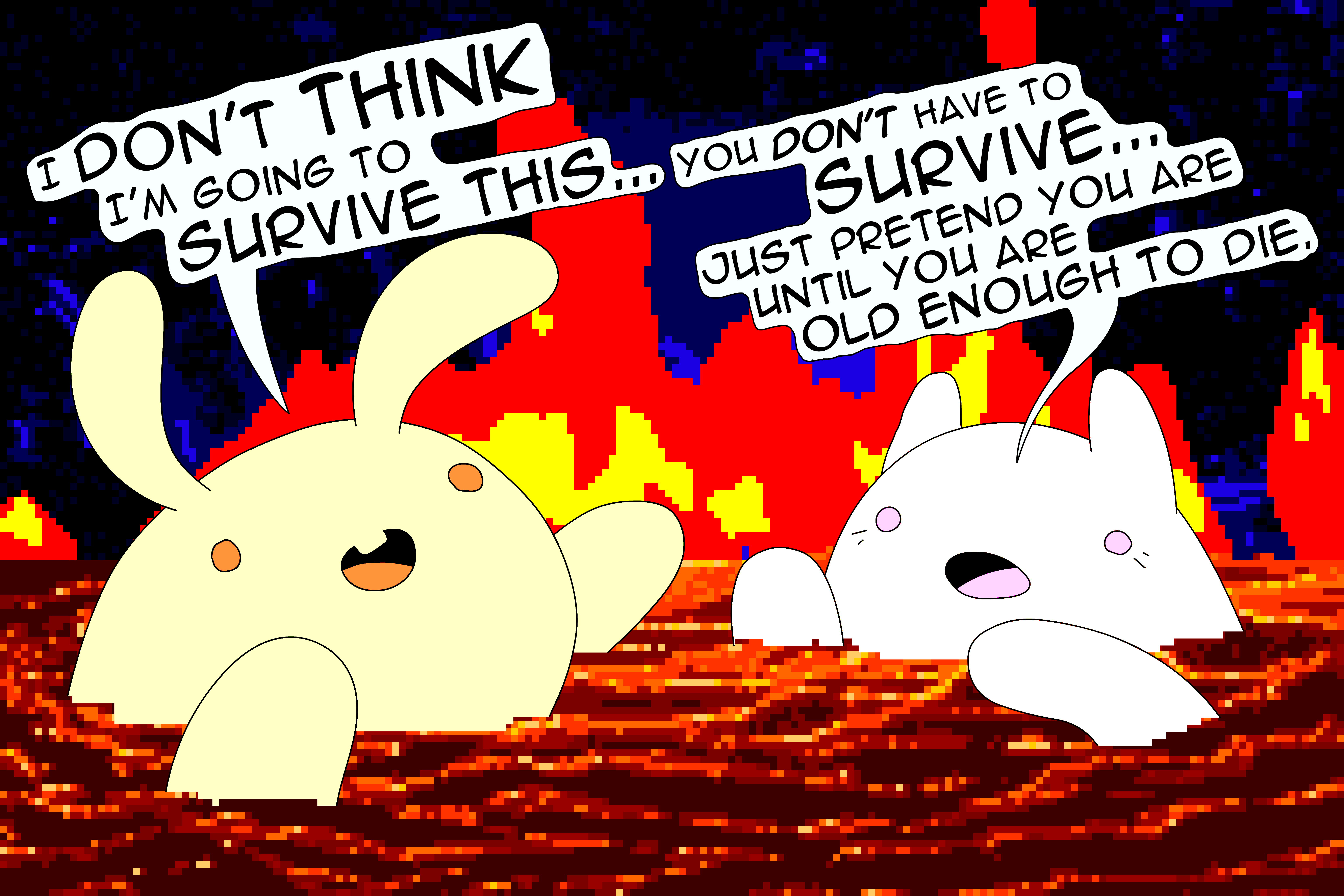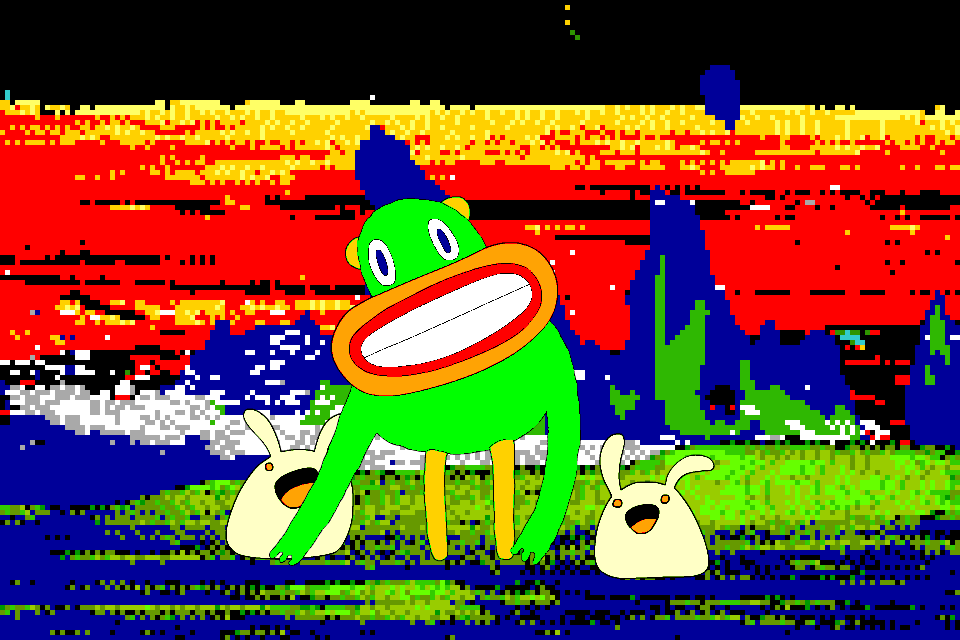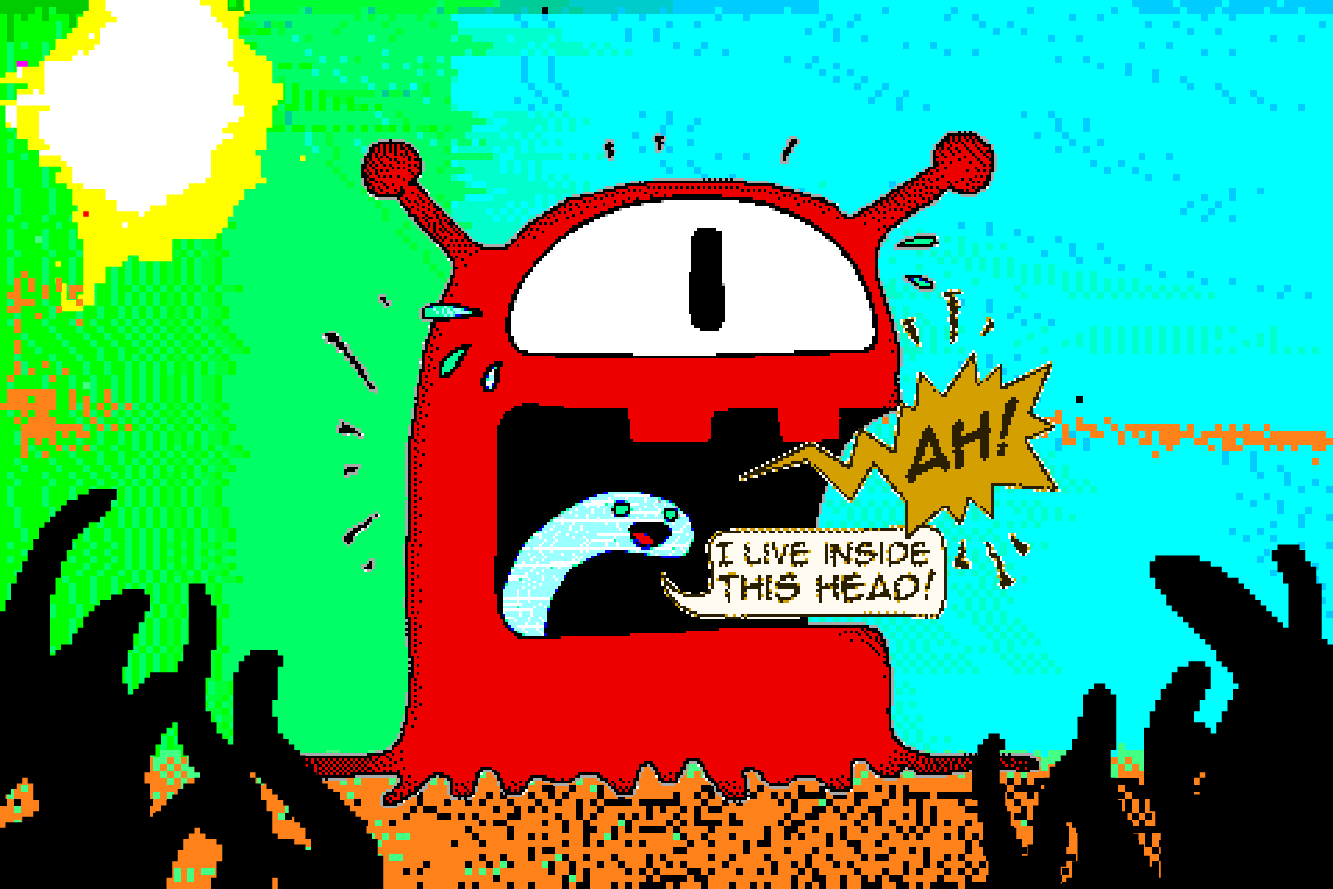Nathalie Lawhead had a busy 2017. Her autobiographical digital zine Everything is Going to be OK released, was shown publicly, and was nominated for IGN’s Most Innovative Game Award. She was also bombarded with harassment and chronicled her experiences creating personal works through a series of essays. I was impressed with her work and reached out to dig a little deeper into what lead her to create one of 2017’s most interesting experiences.
Hi, why don’t you introduce yourself to the readers who may not know who you are yet.
Hi everyone! I'm alienmelon, or Nathalie in real life. I make interactive art that people call games. I love indie games, alt-games, short form games, obscure games, and personal games, as much as I love anything else experimental about computers.
I began as a net-artist in the late 90's, early 00's, and have been doing this stuff since my first release in 1999. I had a secret internet art personality in high school where I was releasing this stuff that ended up having a cult following, people wanting to work with me and sending me their resumes, but nobody knew that it was just some punk teenager behind it. I didn't share that I was doing this with any of my friends there either because nobody really understood what I was trying to tell them, so I was always kind of a cool weirdo. After high school I stepped up to doing this as a serious passion. All the professors told me that the internet is a niche and computers will destroy my creativity, so I decided to leave, ignore everyone, and do it anyway.
I've been at it for a while now… That's my creative life in a nutshell. Never underestimate teenagers.

So you made Everything is Going to be OK but you’ve also been writing a lot about interacting with the games community and the perils of making a personal game. Why have you been so open about this, and what’s the reaction been?
The transparency is important because I hope that it will help others that set out to do something like this. If you are ready for it, and know what to expect, then I hope you are less likely to get hurt, or run away from games because of negative experiences. It helps to know what to expect. I also hope that whatever information I shared about the creative process might inspire others to try exploring similar themes.
AAA games, or any other mainstream part of games, have people constantly sharing their best practices. I feel like alt-games should have something like that too, to help us all make better, more beautiful, interesting, disarming, chaotic, personal, alt-games. By sharing these processes I feel like I'm kind of validating that importance. People will know what it's like.
When I set out to make Everything is Going to be OK, I thought I was ready. I see that I underestimated the personal toll that some of the more pointed toxicity can take on you. It helps to know what exactly to expect so you can start putting up your mental defenses and learn not to take certain people so seriously.
Reactions to "Everything is going to be OK" have been fascinating. The people that like it really like it. I've gotten so many messages now from people thanking me for making it, how it has helped them, and how it has helped them laugh at their trauma... Also, that it has helped people understand friends that struggle with trauma. So there is the positive value and that’s why I made this.
On the other hand there were people using what I shared in the game to send me specifically hurtful messages. Those hit me pretty hard and I should have been ready for that but the entire thing has made me confront some things about myself that I've been avoiding for a long time, so maybe even that ended up for the best.
The game has been a crash course for me in regards to how much more work there is still to be done in carving out a space for games like this. Reactions like "lol, acid" and "what the fuck weird game" tell me that we have to really work on a more nuanced way of discussing these games. They are legitimate art and we can talk about them without this dismissive language that's based more in ridicule than critical discourse. These games matter too. The creators put a lot of effort in them. The popular view seems to be that they are a joke, or exist to be laughed at.
Art requires space for personal interpretation. You look at it, you listen, and you think. It’s kind of an exchange between you and the art. Critical thought is so important. In most of these popular game spaces, there isn’t room for that. It's about being cool, acting, and throwing smart comments around. The consumer culture surrounding games just does not mix well with art.
In terms of accepted behavior, the space encourages harassment more than it does anything insightful.

You describe Everything is Going to be OK as an interactive zine rather than a game. What did you learn from the zine community, and what do you want other developers to borrow from the zinesters?
When I lived in Europe we made zines but I didn't know what they were called. They were just, you know, student publications. It's so funny because I had no idea that they were called zines. They were these things where you cut out faces of political figures and make anarchic art statements out of them with some socially critical writing challenging "the man" or other institutions. Then I was introduced to zines that are about other stuff like, poetry, art, games, cute things, silly jokes... I'm into it! I got the opportunity to showcase "Everything is going to be OK" at Playdate (part of the LA Zinefest) and it was like finding a home that you didn't know you had.
What zines were initially for me, and what Everything is going to be OK is, are pieces of personal writing and abstract cut together imagery to convey a theme. The way these visuals are made are very in line with zines, but instead I use virtual content. For example, I use public domain footage from archive.org, the footage used is often not of anything. Just some odd blur in the corner somewhere that could almost look like a hill, sea, sun... If you put all those bits together you get these really beautifully distorted, almost alien, scenery. That coupled with more or less traditional cartoon animation that's also degraded make for what I feel like is a virtual zine.
The topics I cover are personal and the writing is expressive. They're vignettes, which zines often are... It's a wonderful format to consider for a game. It's expressive, personal, and messy.
If you step outside of the mindset of "Ok, I'm making a GAME now" and start calling what you are doing by different labels, you end up with some really fascinating avenues to explore. Just let go of "game" and try exploring what other formats would be like if they were interactive. Creatively speaking, it's very liberating.
You’ve announced that you’re updating EiGtbOK with more content. What more do you feel you need to add to the experience? Will we see anything that calls back to the reaction to the game and your experiences at this past Day of the Devs?
I feel really bad for having dragged Day of the Devs into this commentary. It was an honor to be there, and I was so happy for the opportunity. Nevertheless, the reactions I received there were notable enough that I felt it was important to comment on players, and how art games are treated.
I was prompted to expand more on "Everything is going to be OK" partly as a result of gamer outrage spurred from my post about Day of the Devs, and then more outrage spurred from me talking about games that don't have to be fun, and then more outrage for me suggesting that games aren't art if we can't allow diverse experiences to exist... overall, there's been a generous landslide of outrage. It’s good food for thought though! So I feel like, fine. I'm going to go do exactly what pisses you off about this "game" and add some seriously real shit to it.
It's worth noting that one of the most common comments I received was that if I didn't want to receive this harassment, negativity, toxicity, etc then I should have made a more fun/better game. This was phrased in a variety of colorful ways, but the gist of it reminded me a lot of our cultural tendency to victim blame. It kind of took me back to when I was dealing with sexual harassment or stalking. People automatically started questioning me about what I did to bring this on myself. This is EXACTLY why I made "Everything is going to be OK". To strip the shame from talking about these things. To, in some small way or another, challenge victim blaming.
The game is very metaphoric. A lot of the content could fly over someone's head. So I think if I add more literal personal stories then the piece would be a lot more pointed.I have to share some stories for how it was like for me, and my own personal conclusions, to make this better social commentary. It's terrifying for me. This is stuff I can't talk about to people close to me, and now I'm dissecting this in a game.
The update will be sharing my own conclusions from past experiences and what I did to feel "ok" again after them. I'm making a strong point not to blame people that consider suicide, or have to fight with that level of depression. I discuss how we justify how important the abuser is, how important their work is, how much value they bring to society, and based on that value, we judge their victims. I point out how this abuse is on all of us as a culture, because we enable the abusers.
I also discuss hope at the end, as a survivor. The personal strength of the survivor. Pride, and hope, are an overarching theme. After this update, I really can't make things more clear. I hope that it will create some understanding.

In your most recent essay you very pointedly say that "Holding vulnerability, and emotion, at a comfortable distance is kind of a disservice to any creative medium” and I think this is both incredible and beautiful. Can you go into a little more depth about the way you’d like to see developers approach honesty and vulnerability?
Thank you!
I said this after a slew of outrage for my suggestion that games don't have to be fun. The emails and messages were … colorful.
It's interesting that we have very specific emotions that we are comfortable with asking the player to feel.In horror, it's OK to scare them. Horror is probably the only space where it's "cool" to let the player die. I guess visceral thrills are OK as long as we're not being asked to think about social implications, societal issues, and injustices... You know, keep deeper meaning out if it otherwise it's SJW bullshit. Thrills are great as long as we can win at the end, in some form or another.
AAA games have these scenes that we'll happily call profound ...The Last of Us has quite a few of these. They kind of come off as "powerful" but in the end you're still the hero, it's a "safe" kind of vulnerability. If these scenes were held in comparison against other mediums ours is very starved of emotional complexity. If some of these scenes were movies it would just barely pass as nuanced. Games, on the mainstream level, lack depth.
We can ask the player to feel things other than victory at the end. We should. Ok, fine, this is art. Let's do it! Let’s do away with the set ideal that games have to be fun and make stories about victims and loss. Let's allow people to cry and form their own conclusions. Art is open to interpretation and games can be that too. Let's say that pain is real, and here is something that talks about pain. Let's admit that life isn't always about winning. It is absolutely OK to lose. It's OK to not know what to do anymore. It is totally OK to give up. You don't have to be a winner. You can just survive too. There's room to comment on how life is.
All this asks for an array of emotional complexity to be allowed in the medium.
I realize that this is a platform heavily weighed down by its need to be entertaining. I don’t criticise consumerism or entertainment, what I do criticize is the basis that they are the only things allowed in games.
Games that make us feel uncomfortable, vulnerable, admit a level of brokenness, and that maybe we just can't win, are way to easily brushed off as "weird" or an acid trip. It's sad because you wouldn't do this to a novel. It's OK to discuss victimhood in literature. Even mainstream movies have a better space for this. The space games allow for this is really superficial. It's "safe", and controlled. We all want to be the hero in the end. If this is the only thing that we are OK with, in this medium, then we're missing out on a lot of other human experiences.
So, in terms of other developers... maybe we can start thinking that we don't have to make things with a "win" at the end. Maybe it can also be about failing, giving up, exploring other states outside of the boolean win/lose that we have. We can risk not being fun. There is value in that discomfort, because you start to see how it unravels other states. It's commentary on the human condition.
This interview has been edited for clarity and length
Did you like this post? Tell us
itch.io is an open marketplace for independent game creators. It's completely free to upload your content. Read more about what we're trying to accomplish and the features we provide.
Leave a comment
Log in with your itch.io account to leave a comment.
Excellent interview. I've been thinking a lot about the way many smaller games are consumed for content. My latest game received the same sort of commentary mentioned in this article ("weird", "this person was on drugs", "this isn't a game"). I see this with lots of games and while I don't find the comments negative, the reaction always signals to me a lack of language to describe games with more of a focus on an ethereal, evocative, and surreal atmospheres. Likely from a lack of exposure to smaller games and the discussions and community around alt/art-games.
I agree with The Last of Us (and many other AAA games) doing an average job at best at any type of emotionally complexity. I can also never get over the massive ludonarrative dissonance. Games like this are fun, but I rarely get emotionally invested in the stories. I guess this is why I gravitate towards smaller intimate games such as Nathalie's. There's no need to force a fun quota down your throat. They can take their time to create an intentional space where every piece organically connects. There's more room left open to explore within you how the experience elicited an emotional reaction that feels unique to you.
I appreciate the transparency with your development. Thank you for sharing such an insightful interview. It helps clear away the more negative discussion around alt-games I often see online.
Thanks for this interview. Someone thinking this deeply about games and where this art form could bring us is like having a fairy godmother who loves us and wants us to have the wildest, brightest, most colorful life possible while we are on Earth. I feel lucky to have Alienmelon thinking and preparing these zines for us. I know her thoughts are profound because I recognize my deepest emotions in what she is saying here... my deepest emotions that I have not yet been able to untangle, express and move past. You know, normal Human life emotions. Like, why aren't I happy, I've done ok for myself, no?
Alienmelon seems to have thought through everything already, and she is a century ahead of us... she's moved on to mastering how to present to others how to get started addressing the wordless, deepest Human emotions.
I think that there is this concept of intimacy related to the experience of playing that I want to see more in videogames.
It is something that it's hard to express because the medium is too often all about the disparity between the player and the game and when the balance isn't there, it becomes hard to intimately establish a communication.
I hope to see more players willing to open themselves to these experiences without demanding a standardized fun that makes the environment of videogames stale
Great interview. I can't agree more with most of the points. It's so frustrating to me that games are such an ignored medium for artistic personal stories. Too few creators taking on the challenge and speaking up for it and too few giving it the respect it deserves. Thanks for sharing your voice.